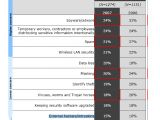Delivering user protection is not a process limited to installing a security solution. It is, in fact, knowing the threat environment to a level where the familiarity will be synonymous with superior security. And while for home users deploying a multi-purpose antivirus is a sufficient move, the same is not valid in the corporate environment. At this tier, information about the threats and the risks faced by businesses are in direct correlation with the security measures deployed. But at the same time, this process is reversible, as the mitigations deployed can indicate the biggest concerns in terms of security. According to a Microsoft study made available for the public, Spyware is still the top concern among IT managers.
"Microsoft's Forefront team has posted a new study conducted for Microsoft by CMG Market Research measuring the perceptions of 1,274 information technology managers in the U.S. toward 12 security concerns, such as malware, temporary workers, hackers, phishing, and more. The survey found that Spyware is still the #1 security concern (24%) that survey participants didn't feel was being adequately addressed. The study measured levels of concern between 2006 and 2007", revealed Brittany M., from the Microsoft Forefront team.
The security concerns expressed in the survey reveal the fact that current security solutions are doing an excellent job in protecting against what have now become traditional threats. In fact, the general concern over the risks posed by spyware, adware, spam, phishing, viruses, worms, Trojan horses and External hackers/intrusions are all down compared to 2006. Considerably down.
But at the same time, data loss is on the increase. Such scenarios, where confidential or otherwise sensitive information is exposed, puts at risks both consumers and the company, from the employees to the brand. According to Microsoft, concerns with protection against data loss are on the increase, while in the background temporary workers, contractors or employees intentionally distributing sensitive information are also perceived as threats.

 14 DAY TRIAL //
14 DAY TRIAL // 
